Determining whether or not a specific hotel operates in an environmentally sustainable manner can be tough. Greenwashing abounds throughout the travel industry, and a full-circle approach involves more than swapping styrofoam food containers for biodegradable ones. It’s getting easier to tell whether a hospitality provider lives by what it says, however, thanks to the increased adoption of third-party certification in vetting hotels’ and resorts’ sustainability efforts. One prime example is the “Sustainability Certification” label posted on validated property listings at the online travel agency site Booking.com.
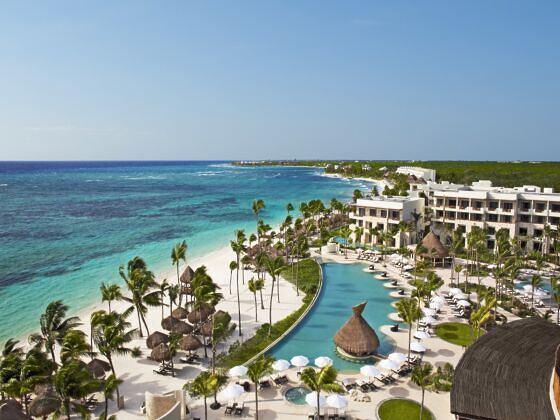

How to Find Out if Your Hotel Is Actually Sustainable – and Four Beautiful Ones That Are

Look for this depiction atop Booking.com listings. Photo: Screenshot/Booking.com
Since 2021, Booking.com has recognized certified sustainable property through its Sustainble Travel Program. It has since published an Annual Sustainable Travel Report to monitor the importance of sustainability across the travel industry. Coming across an accommodation labeled as more sustainable is more appealing to almost half of travelers (45 percent), according to Booking.com’s 2024 Sustainable Travel Report, and consistency of certification standards is critical to identifying these options with 67 percent agreeing that all travel booking sites should use the same sustainable certifications or labels.
How to find out if your hotel is actually sustainable

Photo courtesy Booking.com
A few factors to look into when booking a hotel, if sustainability is top of mind for you:
- Does the property offer electric vehicle chargers onsite?
- Does the property run on renewable energy, and/or does it produce any of its own power through an on-site array?
- Does the property offer recycling?
- Is the property located near public transit, and/or is it walkable to the activities you plan to do while visiting?
- Does it provide plastic-heavy disposable toiletries, or are they zero-waste?
- How does the hotel’s food service operation handle food waste, and critically, where does it get its food?
This last point is an important factor often overlooked or misinterpreted because it’s so easy to slap a label like “locally sourced produce” on a menu. Often, that can mean little more than a few heads of lettuce were bought at the farmers’ market when in season. A restaurant or food service operation doing this the right way incorporates vast sourcing from local purveyors including farms, ranches, and other producers. It minimizes food waste through composting and other efforts, and prepares food fresh to order rather than pre-packaging it. Of course, it’s tough to be full circle at all times in a commercial kitchen environment, but properties making a true effort are generally quick to point out what they’re doing.
Travel inevitably impacts the environment – why do our choices matter?
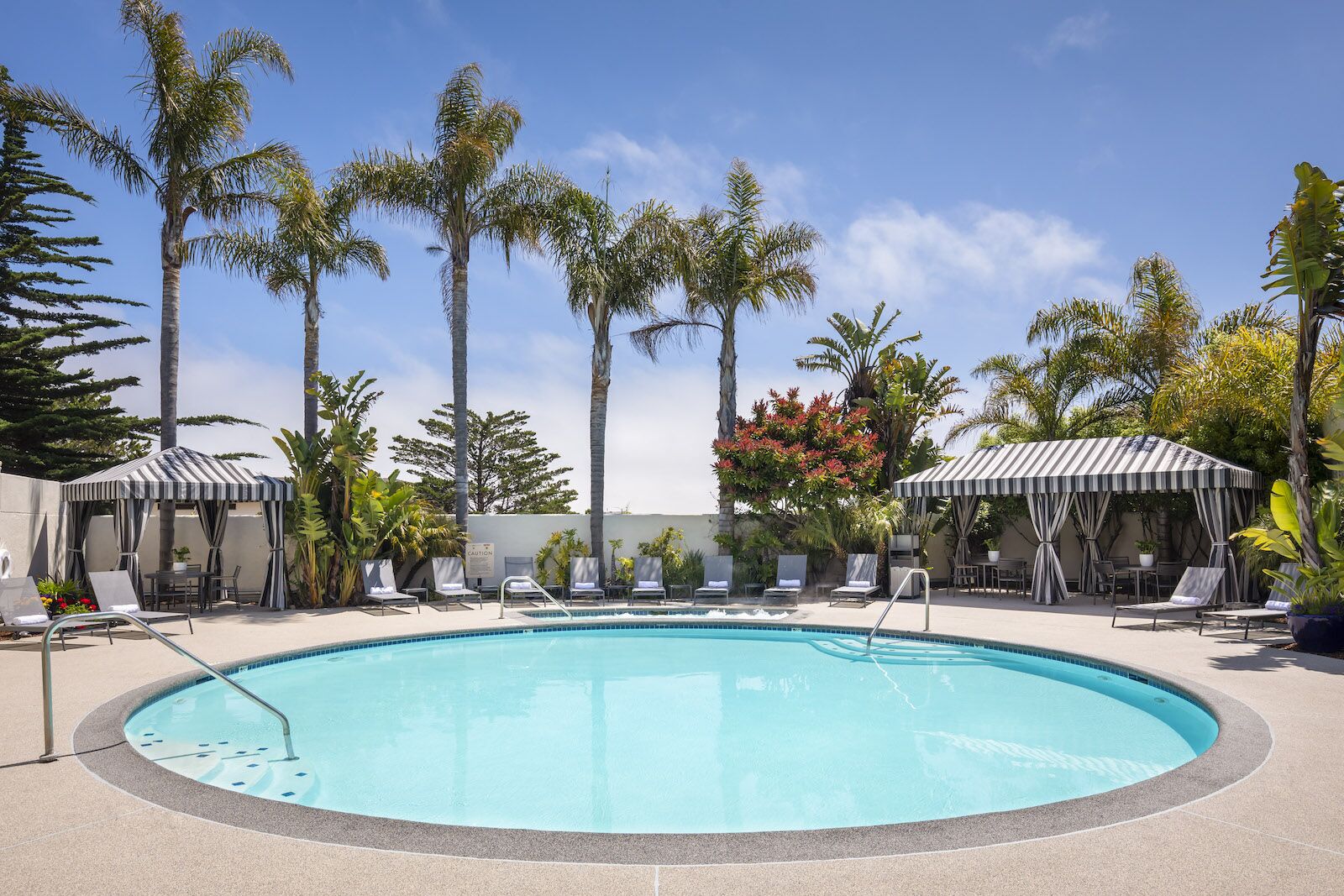
Photo courtesy Booking.com
The only way to truly not let travel increase your carbon footprint is to stay home. However, when done correctly, the net benefit of travel is a positive for the traveler, the destination, and the planet. There are two primary reasons for this. First, travel opens the mind to broader perspectives and increases cultural understanding, which can increase empathy and, at the very least, showcase why conserving places and resources beyond one’s backyard is important. The second reason is simpler and less subjective: travel stimulates local economies. It creates jobs, reduces poverty, and can provide a significant economic boost to the destination.
The Booking.com report found that 62 percent of travelers realize they are the best version of themselves when they make conscious travel choices. It’s easy to impact those you travel with when you insist on doing things the right way. It’s also easy to leave that mantra as your travel legacy – when you patronize businesses that prioritize sustainable business models, your dollar stands as a vote for that way of operating.
“Of those who adopted sustainable behaviors on their travels, it was seen as an enhancement for 96% who did tours or activities for authentic, local, and cultural experiences, 93% who shopped at small, independent stores, and 93% who planned their trips so that they could walk, bike, or take public transport,” the study notes.
How Booking.com determines if a hotel is operating ‘sustainably’
According to Booking.com’s sustainability report, 71 percent of travelers wish to leave the places they visit better off. Where they stay can play a big role in helping them accomplish this. That’s because hotels consume a lot of energy – the average hotel spends more than $2,000 per room on electricity each year. That’s a lot of power, and offsetting even some of its carbon footprint by incorporating renewable energy or cutting down on electricity use can really make a difference.
“While many travelers have retained a sense of optimism and a desire to have a more positive impact, there is a critical opportunity for the industry to accelerate efforts to make those choices easier for everyone,” says Danielle D’Silva, head of sustainability at Booking.com, in the sustainability report. “It’s important that we continue ensuring that more sustainable options are not only readily available, but also easy to trust and understand.”
Booking.com analyzes several key metrics to determine how “green” a hotel’s operations are. Primarily, the property must be certified by an approved certification body that has dated its efforts to reduce its impact on the environment. Factors like energy use and how that energy is generated, how the property handles waste collection and removal, recycling programs, and the use of EnergyStar appliances and LEED metrics (or similar for non-US properties), are considered. Because the site lists labeled properties around the globe, enacting a layer of consistency in its badging is a necessity.
The company employs Travalyst, a third-party company to determine this to be more transparent and avoid conflicts of interest. The online travel agency also works with BeCause to measure the data collected by Travalyst to verify that it meets Booking.com’s sustainability standards. Once this process is complete, a lodging property becomes eligible to have the sustainability label displayed on its property.
“It’s important that we continue ensuring that more sustainable options are not only readily available, but also easy to trust and understand,” D’Silva says. “That’s where we believe further education, clear and consistent standards and credible third-party certification of legitimate sustainable practices across the travel experience can really help. “
Some of the world’s most beautiful hotels have earned Booking.com’s Sustainable Travel label
Fortunately for travelers looking to book a Sustainability Certification labeled hotel, there’s no need to sacrifice stunning properties and excellent service. Booking.com’s 2024 Sustainability Report found that badged properties are often located in destinations that prize sustainability and conservation, such as Monterrey, California, and Utrecht, Netherlands. In addition to those two destinations, Baie Sainte Anne, Seychelles, and Akunal, Mexico, offer exceptionally high percentages of eco-friendly lodging properties.
We hope you love these sustainable hotels! Just so you know, Matador may collect a small commission from the links on this page if you decide to book a stay. Listed prices are accurate as of the time of publication.
Portola Hotel & Spa – Monterrey, California
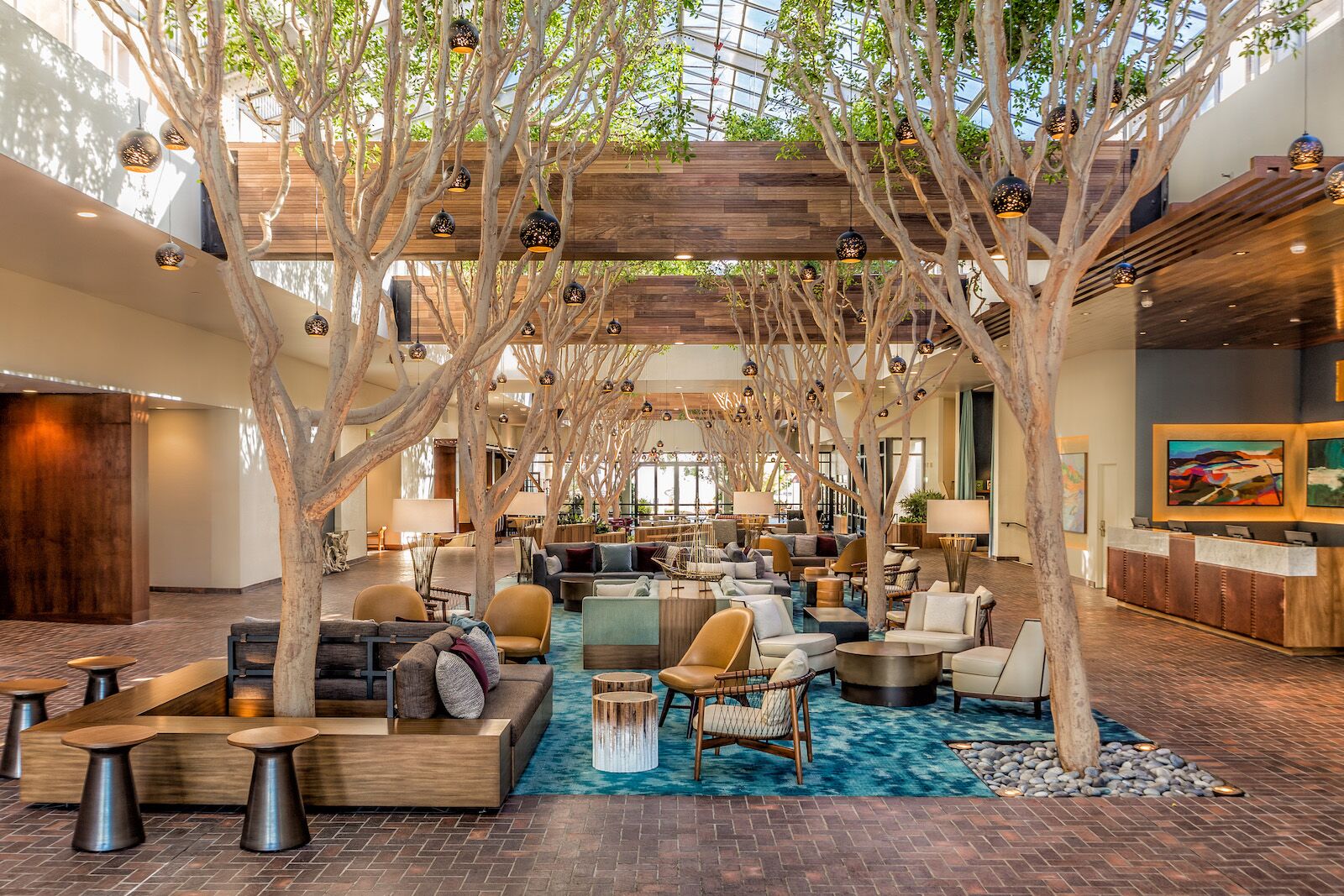
Photo courtesy Booking.com
The Portola Hotel & Spa prides itself on being environmentally conscious. It was the first truly “green” hotel in Central California and holds a U.S. Green Building Council LEED® Certification. The property incorporates sustainable practices throughout the hotel, from guest rooms featuring low-flow fixtures and LED lighting to offering organic bath amenities and using recycled materials. It even has a program for reducing waste at conferences.
What this hotel does to encourage sustainable travel:
- Water conservation: The hotel has installed low-flow faucets, showerheads, toilets, and urinals.
- Energy efficiency: Guest rooms boast LED lighting and Energy Star® certified televisions and mini-refrigerators, reducing energy consumption.
- Sustainable Materials: The hotel uses bath amenities made from renewable and biodegradable materials, and offer hypoallergenic and organic mattresses.
- Eco-friendly conferences: The hotel offers a special program for conferences and events that emphasizes using reusable materials, composting food scraps, and recommending eco-friendly vendors.
Grand Hotel Karel V – Utrecht, Netherlands
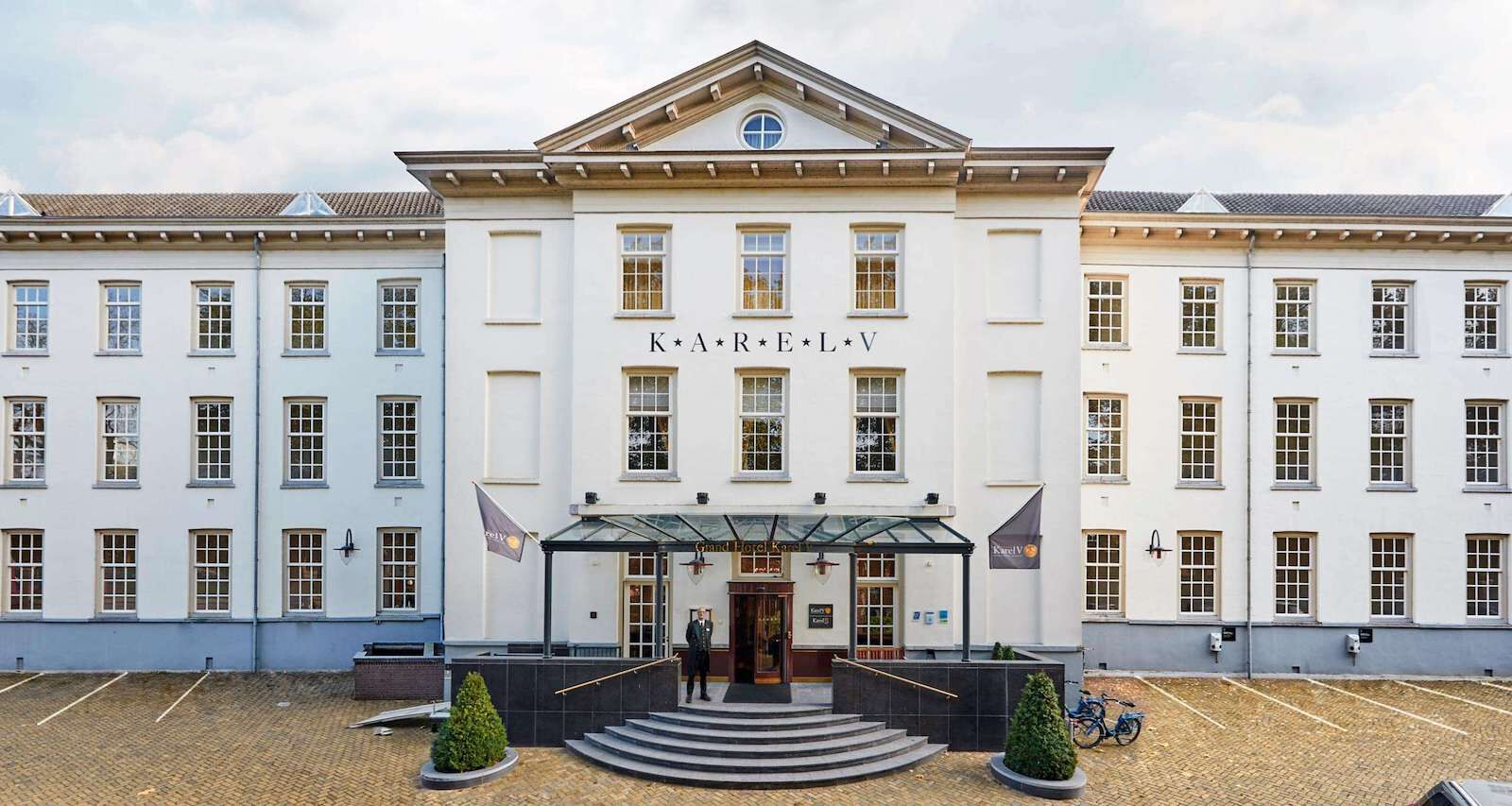
Photo courtesy Booking.com
It’s tough to gain sustainability certification when located in a historic property. Grand Hotel Karel V in Utrecht, Netherlands, has done it by focusing on its operations management. occupies part of the impressive Duitse Huis complex, which includes a section of a 14th-century monastery of the Teutonic Knights. The hotel offers an expansive garden stretching across much of the property, a fitting feature for its Netherlands location that allows for the placement not only of flowers but of vegetation that thrives in the local environment. Most rooms reside in a meticulously restored 1823 military hospital, offering a unique blend of old and new. The hotel also features a Roman-themed health center and an on-site restaurant and bar.The Grand Hotel
What this hotel does to encourage sustainable travel:
- Sustainable procurement: They prioritize using environmentally certified suppliers who adhere to a specific code of conduct.
- Green cleaning: The hotel utilizes biodegradable cleaning products throughout the establishment.
- Water & energy management: While extensive renovations for maximum energy efficiency are difficult in a historical building, it does make optimal choices in equipment and energy management.
- Waste reduction: The hotel practices maximum waste separation with a dedicated storage facility.
- Locally sourced produce: The hotel collaborates with Maarschalkerweerd, a nearby organic vegetable garden, to incorporate fresh, local ingredients into their restaurant menus.
Secrets Akumal Riviera Maya – Akumal, Mexico
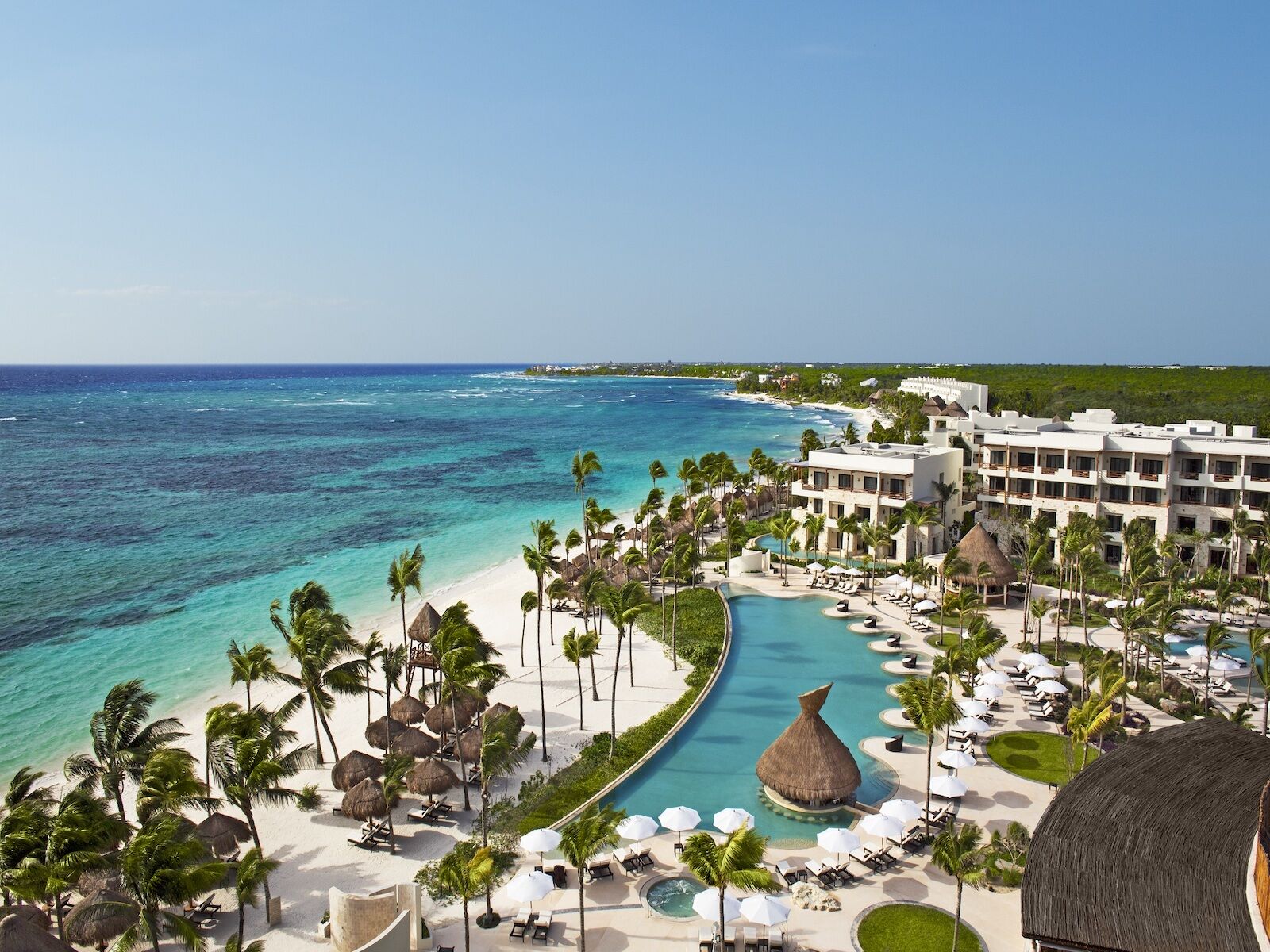
Photo courtesy Booking.com
Just north of the Tulum Archaeological Site, Akumal is a respite from the hustle of the busy city centers in Tulum and Puerto Escondido. Secrets Akumal Riviera Maya is adults-only and offers the typical amenities of a Riviera Maya beach resort, though with a focus on minimizing its environmental impact. The buffet is expansive, the pool is beautiful, and the beach is right there. Guests can take the hotel’s airport shuttle from Cancun and once on the property, don’t need to leave if they don’t wish to – unless it is to visit the ruins or head out for some street tacos in town.
What this hotel does to encourage sustainable travel:
- Environmental certification: They’ve achieved certification by Preferred by Nature™, a program aligned with the Global Sustainable Tourism Criteria. This demonstrates the hotel’s commitment to minimizing its impact on the environment.
- Wildlife protection: Being located in Akumal Bay, which means “place of the turtle” in Mayan, the hotel actively participates in the Akumal Bay Management Plan. This plan promotes responsible practices to safeguard the local sea turtle population.
Fairmont Pacific Rim – Vancouver, Canada
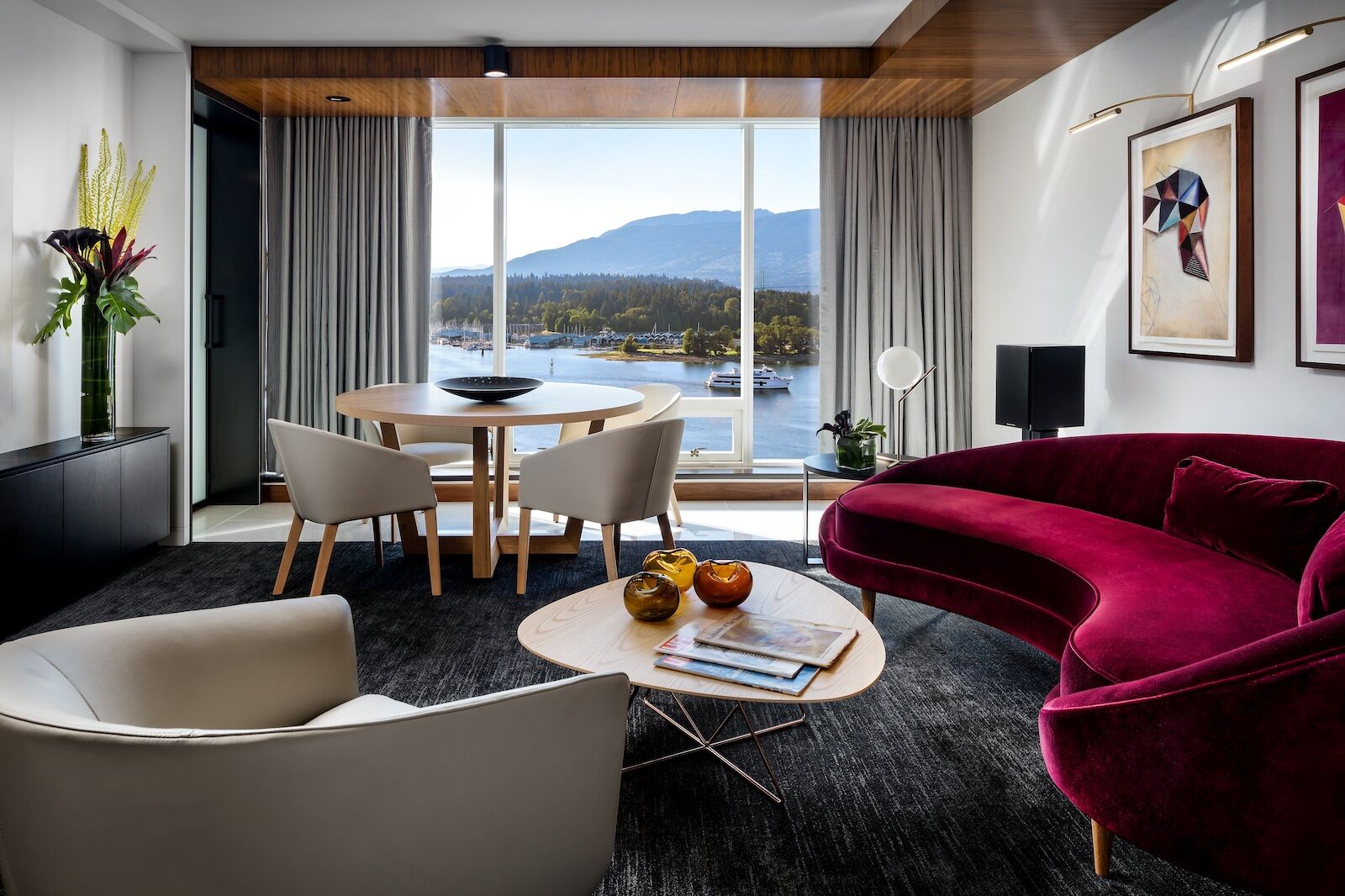
Photo courtesy Booking.com
Not to stay at a Fairmont hotel is not to fully experience travel in Canada. Vancouver’s Fairmont Pacific Rim, located in the heart of downtown along the waterfront, features a rooftop pool and hot tub, a massive gym, and a raw bar featuring locally sourced seafood.
What this hotel does to encourage sustainable travel:
- Eliminating single-use plastics: The hotel achieved a major milestone by becoming the first North American hotel to be certified plastic-free by GreenStep Solutions. This means it’s replaced non-essential single-use plastics in guest rooms, public areas, restaurants, and the spa with reusable or sustainable alternatives. Examples include replacing plastic keycards with wooden ones, installing refillable toiletry dispensers, and offering fiber-based takeout containers.
- Sustainable seafood: The hotel’s commitment extends to their culinary offerings. It prioritizes using sustainably sourced seafood in all their restaurants, ensuring responsible fishing practices and healthy ocean ecosystems. The hotel has also adopted the Orbisk Food Waste System, a technology that helps them manage food waste more effectively.